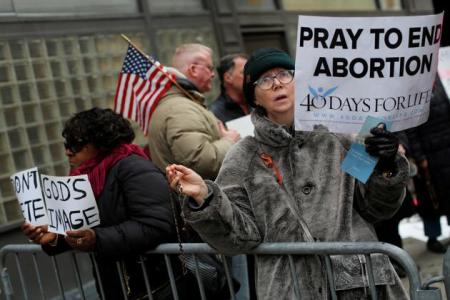New York drops lawsuit against church members who protested outside abortion clinic

New York Attorney General Letitia James has dropped a lawsuit against a group of pro-life sidewalk counselors, including 10 church members, accused of harassing people at an abortion clinic.
In a dismissal agreement released Tuesday in the U.S. District Court for the Eastern District of New York, the state agreed to dismiss its complaints against around a dozen sidewalk counselors in return for no counterclaims being filed. The state will have to pay the litigation costs of the lawsuit.
Liberty Counsel Founder and Chairman Mat Staver, whose organization helped represent one of the sidewalk counselors, considered the dismissal a “great victory.”
“The New York attorney general’s lawsuit was politically motivated and patently frivolous. Our client, Scott Fitchett, did nothing wrong by exercising his First Amendment right to preach the gospel on a public sidewalk,” Staver said in a statement.
Fitchett is a pre-K teacher who spends his Saturdays sharing the Gospel throughout New York City, including outside Choices Women’s Medical Center of Jamaica, New York.
In 2017, then-New York Attorney General Eric Schneiderman filed a complaint against the sidewalk counselors, alleging that they were engaging in unlawful harassment of people at the Choices Women’s Medical Center of Jamaica, New York. In addition to Fitchett, Rev. Kenneth Griepp and 10 members of Church@The Rock in Brooklyn were among the defendants. They were represented by the Thomas More Society.
The lawsuit claimed that since 2012, protesters have “subjected incoming patients to a barrage of unwanted physical contact, as well as verbal abuse, threats of harm, and lies about the clinic’s hours and its services." The lawsuit further accused the defendants of “approaching patients to harangue them, sometimes pinning them against the clinic’s exterior wall or parking meters, and even forcing them into the street and oncoming traffic as they try to escape the protesters.”
“Some protesters go so far as to touch or grab at patients to get their attention and force printed anti-choice materials on them,” the lawsuit added.
Thomas More Society Senior Counsel Martin Cannon said in a statement that his clients are “peaceful, law-abiding Christians who care deeply for the innocent children in the womb being ruthlessly slaughtered in this huge abortion clinic.” His colleague, Thomas More Senior Counsel Stephen Crampton, called the charges in the lawsuit “baseless.” The legal nonprofit maintains that the state's allegations of threats and violence are false.
“We are pleased to see the state of New York has finally come to its senses and dismissed these baseless charges,” Crampton said. “Justice has finally prevailed.”
In July 2018, U.S. District Judge Carol Bagley Amon, a George H.W. Bush appointee, rejected an injunction request by the attorney general’s office, arguing that the claims of alleged threats and harassment by the sidewalk counselors lacked evidence.
“The interactions on the sidewalk outside Choices were generally quite short, and there is no credible evidence that any protestor disregarded repeated requests to be left alone over an extended period or changed his or her tone or message in response to requests to be left alone in a way that suggested an intent to harass, annoy, or alarm,” concluded Amon.
In August, a unanimous three-judge panel of the U.S. Court of Appeals for the Second Circuit upheld the rejection of the injunction, with Circuit Judge Guido Calabresi, a Clinton appointee, authoring the opinion.
“Crucially, however, at this stage and as to the violations it did find, the district court concluded that the Attorney General had not demonstrated irreparable harm,” Calabresi wrote.
“Some members of this Court might have reached different conclusions, both as to the existence of violations and as to the appropriateness of a preliminary injunction. But many of the issues are close ones, and we cannot say that the district court abused its considerable discretion in denying a preliminary injunction.”





















